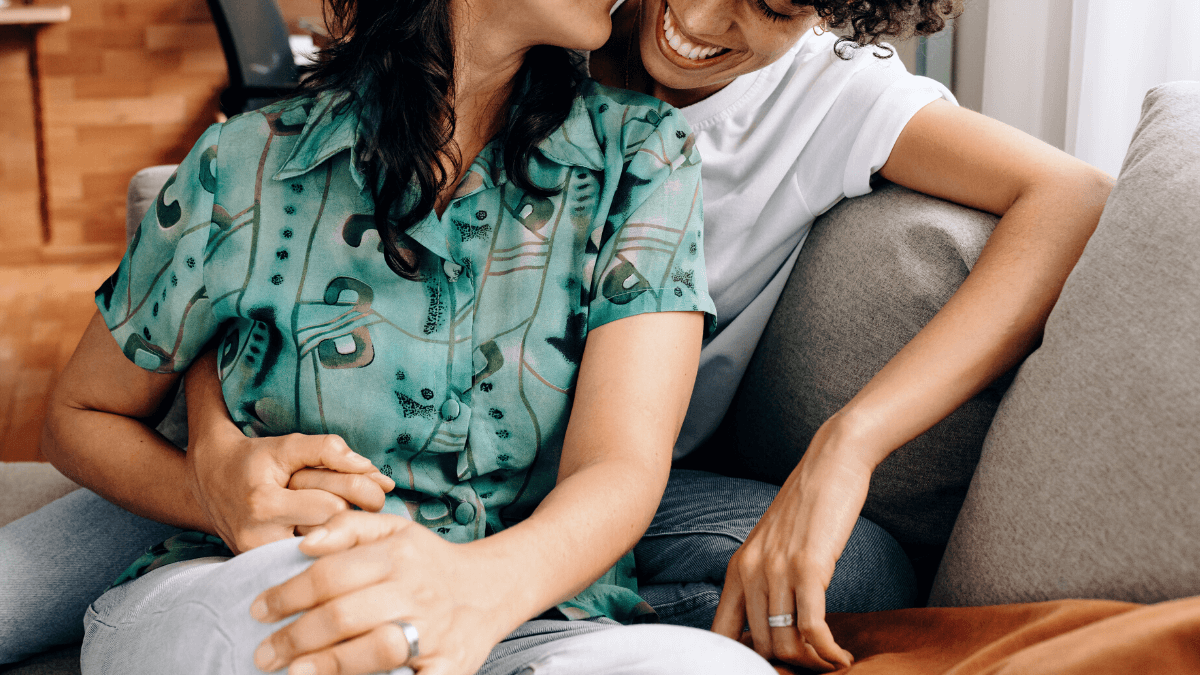Many clients of sex workers love satisfying their playmates.
To anyone outside the sex industry, it might sound like a radical statement. The uninitiated often assume that spending time with a sex worker is all about ‘using someone’ or ‘getting off’. But those of us with experience in sex and sex work - the providers who know their business, and the clients who appreciate them - understand that a good professional experience is often much more about connection than some sort of impersonal ‘happy ending’.
In my decade or more as an escort, I’ve learned that many customers value giving pleasure, and see it as an essential part of an enjoyable experience. As well as receiving pleasure, they want to know that their provider is enjoying themselves too!
But there’s a lot more to pleasure than just intercourse, and if you want to touch your worker in ways that make them remember you, there’s a lot you need to know. I recently spoke with Sexologist Alice Child to explore essential knowledge about the vulva, and how you can use this to ensure mutual pleasure during your paid encounters.
Introducing Alice Child: Somatic sexologist and sex counselor
Alice Child is a somatic sexologist, sex educator, and sex counselor based in Sydney, Australia. She’s certified by the Australian School of Somatic Sexology and is also a member of the Somatic Sex Educators Association of Australasia.
What is somatic sexology, you may ask? Alice offers a definition: “It’s essentially sex education that combines awareness of the body and what's going on inside the body with the science of sex. It’s about understanding, from a neurological and physiological standpoint, what's going on during sex.” She combines coaching, counseling, mindfulness, education, and neuroscience, helping people have better sex (whatever that means to them).
Alice believes that everyone deserves a happy, healthy, and fulfilling sex life. In 2020, she founded Vulva Dialogues, a project aimed at sharing conversations about sex and helping participants learn more about sexual health. Vulva Dialogues has brought sex-positive workshops and presentations to thousands of people globally, working with companies such as Lover, the University of Technology Sydney, NORMAL, and Future of Sex.
This work has broadened her horizons around sexual health. “I started Vulva Dialogues because I was so passionate about normalizing sex-positive conversations,” she says. “It reinforced the need for more expert-led and shame-free sex education, and I saw how this work has the power to change people’s lives. And that's what triggered me to go and get certified as a sexologist. I now work directly with individuals and couples 1:1 online and via my private practice in Sydney, helping people have happier, healthier, and more fulfilling sex and relationships.”
She now works with people of all genders - couples, individuals, and groups - exploring diverse topics of sexuality, intimacy, and pleasure. If you long to pleasure a vulva-owning sex worker, you’re in luck; Alice has a wealth of information to share with you! Here are her tips.
Tip #1: Know the difference between a vulva and a vagina
Being a good lover starts with knowing the right terminology. It might sound a bit pedantic, but being able to correctly name the anatomy makes a huge difference.
In short, Alice explains, the ‘vulva’ is the external genitals - anything that you can see on the outside of the body. “So the tip of the head of the clitoris and the inner and outer labia, for example,” she says. In contrast, the ‘vagina’ is actually just the tube that runs from the cervix and the uterus down to the external part of the body.
A lot of people ask, 'why does it matter whether you call it a vulva or a vagina?' For a long time, ‘vagina’ has been used to refer to all of the genitalia. “And in some ways, that represents our relationship with female sexuality and pleasure,” Alice says, “We assume that most of the pleasure comes from the vagina and from penetrative sex.”
Of course, those of us who have a vagina know that’s not the case! Research has found that between 70% and 90% of people with a vulva can't reach orgasm without external stimulation.
So the vulva is really important for pleasure… and using the right words helps us focus on this area accurately. “Knowing whether we're talking about the outside or the inside matters because if you want to give someone else pleasure, you're going to have to think about whether you're going for internal sensations or external ones.”
Tip #2: Know how the clitoris works
Many folks assume the clitoris is ‘that one spot’ you should aim for when playing with a pussy. But there’s a lot more going on beneath the surface.
Alice says, “People think of the clitoris as this tiny little knob or button that appears on the vulva just above the vaginal opening. It's incredibly sensitive, as there are more nerve endings there than anywhere else on the human body. So. of course, it can feel amazing to get stimulation there. But what people often don't know is that the whole clitoral structure goes right inside the body. It's different for everyone, but it's between seven and nine inches in size. And it's made up of all this erectile tissue, just like the penis is made out of erectile tissue. Like a penis, it needs to be filled with blood to become erect and that happens when you're aroused.”
Once that happens, there’s a lot of extra sensitivity, not just for the visible area of the clitoris but for the vulva and vagina too. “When you’ve been fooling around for a while and your partner is super aroused, the appearance of the vulva will be very different. It’ll be a lot fuller and puffier and more sensitive. And that's because these erogenous tissues and erectile tissues are becoming fully engorged.”
Alice says that the structure of the clitoris helps explain why other places, such as the G-spot, can be so powerfully pleasurable. “You hear people talk about clitoral orgasms versus penetrative orgasms. They're really all clitoral orgasms. You're just stimulating it from either outside or inside the body.”
Tip #3: Don’t use porn as your only source of sex education
In addition to talking about vulvas, vaginas, and clitorises, Alice says that talking about porn is really important.
“It's often where we get ideas and where we learn new positions and new things to try,” she says. “And while that can be helpful, it isn't designed to be educational. It's fast, intense mental stimulation to help people get off. It isn't representative of what feels good.”
Most heterosexual porn focuses on penis-in-vagina (PIV) intercourse, and things escalate at an alarming speed that simply isn’t realistic or enjoyable in real life. “For most vulva owners, it takes time to get engaged enough to feel pleasure with penetration. If you replicate what you're seeing on porn, particularly if you don't use enough lube, it might be really uncomfortable, if not painful.”
Alice takes pains to emphasize that porn isn’t inherently bad. But it’s important to realize that it’s entertainment, not education. “Don't trust that everything you see in porn is going to feel great in real life.”
Tip #4: It’s about pleasure, not about getting off
Let’s tackle the question many of you are probably thinking about: is there a secret to getting a woman (or anyone with a vulva) off?
Let’s stop right there. Rather than focusing on orgasm, Alice recommends taking a broader approach to pleasure. “I feel like we fixate a lot on orgasm being this goal of sex...and I think that can be really harmful. Many people, particularly women, can find it difficult to reach orgasm with a partner, and putting this pressure on people often makes it even more elusive. So the more that we try and take the goal of orgasm out of our minds, and instead just focus on how to give and receive the best pleasure possible, the better.”
This might mean slow, gentle touches in places that are less obvious. “I would reframe erotic touch from just being in the traditional erogenous zones that we think of. Rather than going straight to the nipples or the clitoris, expand your touch to the whole body. Any part of our body can be an erogenous zone if we treat it the right way. Be curious about the ribcage, the side of the breast, the earlobes, or the back…there are so many sexy options!”
It's also about being focused on the present. “Things like slowing down, listening to your body… remaining in the moment, and giving and receiving the best sort of connection and pleasure possible. That should be the goal of sex and intimacy, rather than hunting that elusive orgasm. Because everybody's different. And just because someone didn't climax doesn't mean that they had a bad time.”
Tip #5: Practise good communication during sex
When maximum pleasure (rather than maximum orgasms) is the goal, we suddenly have so many more options for satisfying our play partners. And you don’t have to figure it out on your own! When it comes to hitting the right spots, communication is key.
“There’s this idea that men should just somehow magically know how to be amazing lovers,” Alice says. “That they should intuitively know without being shown. But it’s a myth. While body language and a little bit of trial and error can send you in the right direction, nothing beats clear, honest feedback.”
Her pro tip as a sexologist is to ask open-ended questions, such as, “How can I make this even better?” Queries such as this encourage helpful comments from your provider: 'go a bit slower' or 'a bit to the left.' You might even hear something like, 'Actually, the nipples aren't feeling that great tonight. Could we move on to somewhere else?'
Alice says, “When you get any form of feedback, practice saying 'Thank you'. It might feel really clunky and weird, and not very authentic at first, but it shows that you're not only respecting these requests but also celebrating them.” By accepting feedback graciously, you can adjust your technique and continue without interrupting the flow of the moment.
“It's really scary getting feedback about sex because we can get really defensive and it feels vulnerable,” she says. “But if you try and remove that defensive mindset, and instead think, 'I just want to get even better', you'll unlock your ability to be an amazing lover.”
How to learn more about vulva pleasure
Has all this talk of pleasure sparked your enthusiasm for more learning?
Alice offers a range of services that can be booked via her website. She works with people of all genders in one-on-one coaching sessions, both online and in person. “My work is teaching the vocabulary, tools, and exercises that you can use to make your sex life even more erotic. It doesn’t involve touch, the sessions themselves are educational.”
If you’re not sure whether her sessions are right for you, she also offers free 15-minute consultations. I also recommend following her on Instagram for the latest must-know sex tips.
Alice’s parting words of advice are about being open to new ways of doing things, and never letting sex become routine. “No matter how great our sex life is, or how communicative we are with our partners, we all need to stay curious and keep trying new things. We never want to limit ourselves in what we're able to experience.”
She reminds us that great lovers are made, not born. And if you choose to make the effort, you can be a pleasure expert too.
Get the free email course
Achieve your peak experience with escorts.






